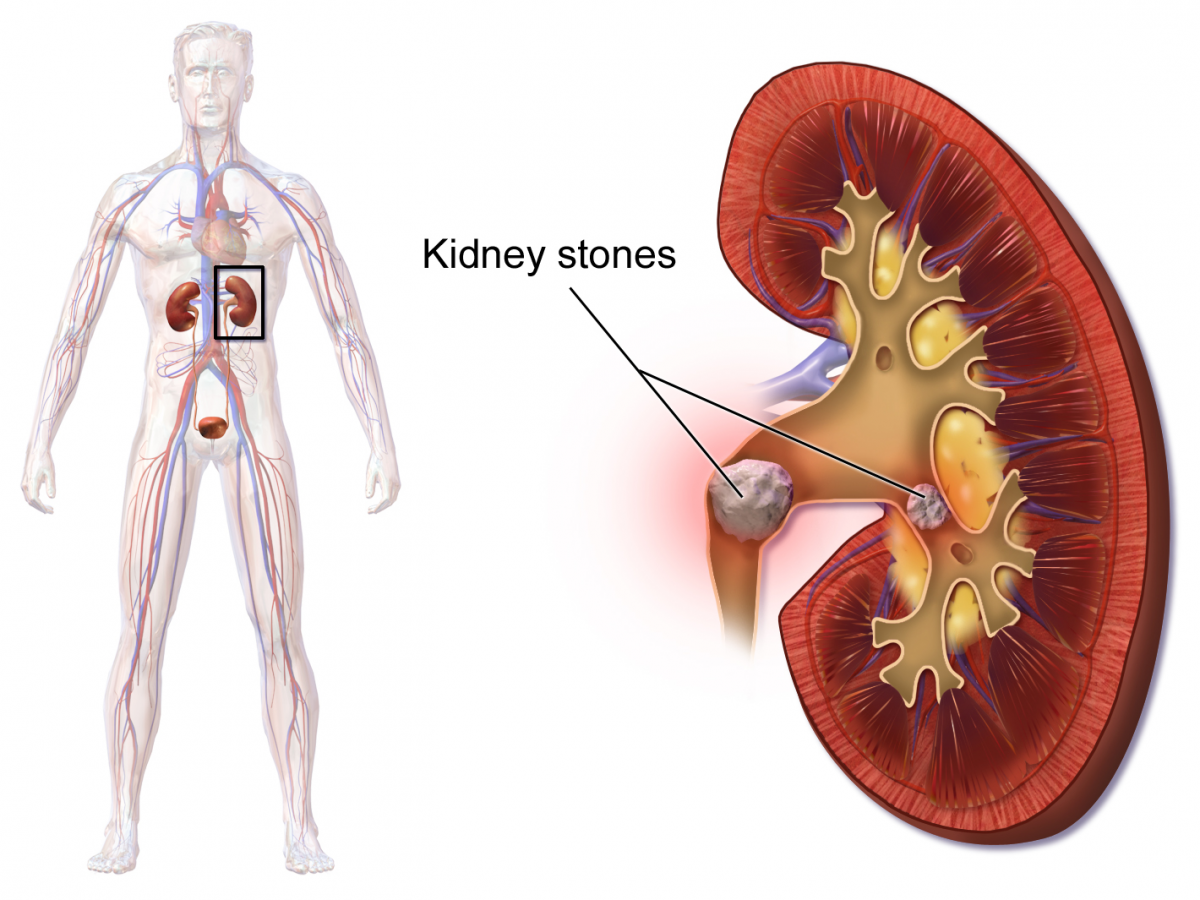What Are Kidney Stones
Kidney Stones are small to tiny sized stones which are created from excess salt and minerals in the urine. The most common reported symptom patients report is severe pain in the lower back. Many patients describe this pain as being similar to delivering a child. Also referred to as nephrolithiasis, there are over 200,000 cases annually in the United States. The majority of kidney stones will pass through your body on their own, however, some will require medical intervention depending on size. Stones can vary in size from a small grain of sand to a large pearl and can stay in your kidneys or pass through your ureters (the tubes that connect your bladder to your kidneys) and eventually exit your body through your urine. This is what is known as passing a stone. When a kidney stone passes it can also get stuck in your urinary tract which can be painful and is a very serious medical concern.
What are kidney stones made of?
Most kidney stones can be classified as one of the following types.
Calcium Stones – These are the most common type of stones diagnosed. Calcium kidney stones are usually made of calcium and oxalate (oxalate is a natural chemical which is found in most foods) or calcium and phosphate.
Uric Acid Stones – These stones form when your urine is too acidic. Uric acid stones can form by themselves or with calcium.
Struvite Stones – Most commonly caused from UTI’s or Urinary Tract Infections. The infection can cause bacteria to create ammonia which will build up in your urine. These stones are made of magnesium, ammonium and phosphate.
Cystine Stones – Although very rare they do occur in a small percentage of patients. Cystine is a chemical which your body creates naturally, a genetic disorder can cause your kidneys to leak cystine into your urine which causes stones.
-
- Not enough water. Staying hydrated is important and helps your body to dilute the minerals which can turn into stones. If you are consuming enough water your urine should be a pale yellow or clear. Dark urine is a strong indication that you are not drinking enough.
- Your diet can also play an important role in the formation of stones. Calcium stones are formed when calcium and oxalate stick together while your kidneys are making urine. Oxalate is in many healthy foods and vegetables. If you have had one of these stones before you should limit your intake of foods high in oxalate such as rhubarb, spinach, grits and bran cereals.
- Sodium can also increase your risk for kidney stones. Sodium (table salt) is introduced through many processed foods, packaged and canned foods. Try to cook fresh meals from raw and whole ingredients. Add salt sparingly to taste.
- Animal Proteins can increase the acidity in your urine. Shell fish and red meats can cause the uric acid levels in your body to rise. These acids can collect in your joints and cause gout, or filter to your kidneys and create stones. Animal proteins also raise your calcium levels and lower the amount of citrate in your body, both of which contribute to stones.
- Gut problems such as IBS (Inflammatory Bowel Syndrome) and Crohn’s disease can cause diarrhea. Diarrhea causes your body to produce less urine which allows for greater absorption of oxalate from your intestine which increases levels in your urine.
- Obesity is also a risk factor for kidney stones. Being obsess makes you twice as likely to get kidney stones. Being obese is defined as having a BMI (Body Mass Index) of 30 or greater. You can check your BMI here with this online BMI calculator.
Treatment
The treatments for kidney stones can vary depending on the size of the stone, what it's made of, how much pain is involved and whether or not it is causing a blockage in your urinary tract. In order to answer these questions Philadelphia Urological Associates can use several methods including urine tests, blood tests, a CT scan and or X-Rays. Sometimes a CT scan will involve contrast dye to improve the image your doctor will review. If you have had issues with contrast in the past in other tests be sure to tell your doctor before the scan.
If the tests administered show your kidney stone to be relatively small, your doctor may recommend pain medicine and lots of fluids. The excess fluids will help carry the stone through your urinary tract where it can then exit your body. If you have a large kidney stone or if it is causing a blockage you may require additional treatment.
Some physicians will prescribe Flomax or a similar medication to help pass your stone. These medications enlarge your ureter allowing the stone to pass with less restriction, causing the patient less pain.
When additional treatments are required the most commonly used is shock wave lithotripsy. This therapy uses small shock waves to break your kidney stone into smaller pieces allowing it to pass on its own. This treatment is normally an out-patient procedure which takes 45 minutes to an hour and is completed under general anesthesia.
Once your stones have passed your doctor may prescribe a medication to prevent any future stones. Calcium stones can be prevented by prescribing a thiazide diuretic or a phosphate preparation. If you had a uric acid stone your doctor may prescribe allopurinol (Zyloprim) or Uloric which can reduce the uric acid levels present in your blood and urine.
If you or a loved one are experiencing kidney stones, please contact Philadelphia Urology Associates online for an appointment today or call us now at 215-563-1199. Dr Sloane and his team are experts in the field and can offer you the help you deserve.
